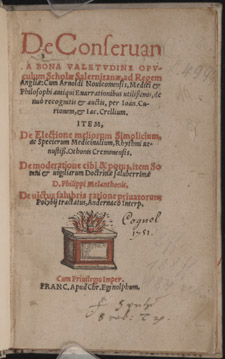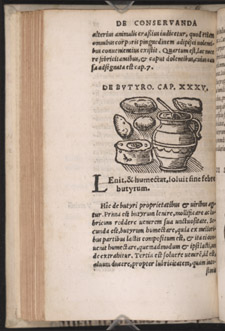Arnaldus, de Villanova (ca. 1240-1311) and the School of Salerno
De conservanda bona valetudine, opusculum Scholae Salernitanae…. Francofurti: Apud Christianum Egenolphum, 1554.
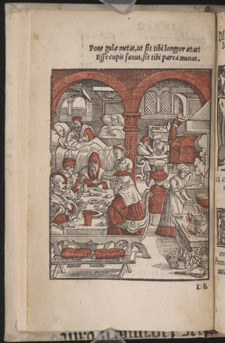
- Arnaldus, de Villonova and the School of Salerno, De conservanda bona valetudine…. Frontispiece. Here is a marvelous portrayal of a hospital. Patients eat and rest, while some workers share a meal and others engage in domestic tasks. Note the leaf was printed in two colors. The edges of all leaves were red-tipped as well. This book was likely rebound in the twentieth century in vellum taken from an old manuscript with musical notes on it.
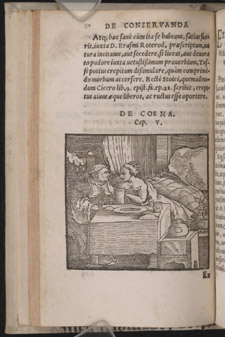
- Arnaldus, de Villonova and the School of Salerno, De conservanda bona valetudine…. Avoid large meals before bedtime.
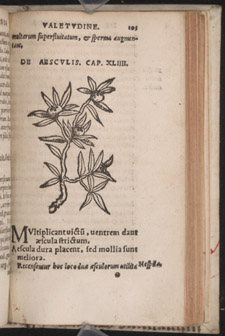
- Arnaldus, de Villonova and the School of Salerno, De conservanda bona valetudine…. De aesculis: the leaves and nuts of a Hungarian oak or other mast-bearing tree (such as horse chestnut).
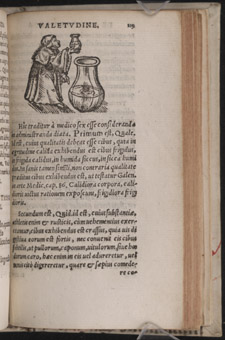
- Arnaldus, de Villonova and the School of Salerno, De conservanda bona valetudine…. More advice about healthy food and drink.
A celebrated Catalan physician, Arnaldus translated Avicenna, Galen, and Hippocrates into Latin. To accompany his translations, he wrote commentaries that connected thirteenth- and fourteenth-century European medical practice with its classical Greek and Arabic roots, and helped move medicine away from folk practice. Arnald devised a medical curriculum at the University of Montpellier, which became the leading center of medical education in Europe. In addition he wrote extensively on religion and alchemy, and his religious writings caused the Inquisitors to condemn him as a heretic.
Of the many books attributed to Arnald, it is often difficult to determine what he actually wrote. Arnald did write the well-known commentary for the Regimen sanitatis Salernitanum. This book of advice from the Schola Medica Salernitana, or the medical school at Salerno on living a healthy life was, based on the number of editions printed, the most popular medical book of the fifteenth century. An early English translation, written as one long poem, begins:
All Salerne School thus write to England’s King And for man’s health these fit advises bring. Shun busy cares, rash angers, which displease: Light supping, little drink, do cause great ease, Rise after meate, sleep not at after noon, Urine and Nature’s need, expel them soon. Long shalt thy live, if all these well be done.
